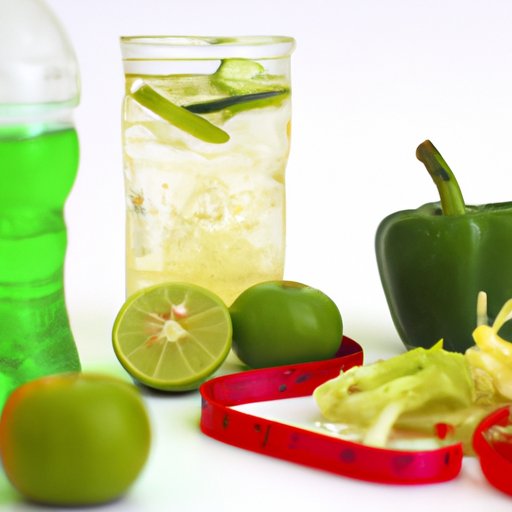Introduction
Bloating is a feeling of fullness or tightness in the stomach that can be caused by gas, indigestion, or overeating. It often results in discomfort and can make it difficult to concentrate or go about your normal activities. Fortunately, there are many things you can do to prevent and reduce bloating after eating.
Avoid Eating Too Fast
Eating too quickly can cause you to swallow large amounts of air, which can cause bloating. Taking your time when you eat can help you avoid this problem. Eating slowly also helps you enjoy your food more and allows your body to better digest it.
Here are some tips for slowing down when you eat:
- Chew each bite of food thoroughly before swallowing.
- Put your utensils down between bites.
- Take small sips of water while you eat.
- Eat with others and focus on conversation.
Don’t Drink Carbonated Beverages
Carbonated beverages such as soda, sparkling water, and energy drinks contain carbon dioxide, which can cause bloating. These beverages should be avoided if possible. If you must drink a carbonated beverage, try drinking it through a straw to minimize the amount of carbon dioxide that enters your body.
Here are some alternatives to carbonated beverages:
- Water
- Herbal tea
- Fruit-infused water
- Unsweetened almond milk
- 100% fruit juice
Eat Smaller Portions
Overeating can cause bloating. Eating smaller portions can help you avoid overeating and reduce bloating. Eating several small meals throughout the day instead of three large meals can also help.
Here are some tips for controlling portion sizes:
- Use a smaller plate or bowl.
- Measure out servings of food instead of eyeballing them.
- Eat slowly and wait until you are no longer hungry before going for seconds.
- Fill half of your plate with vegetables.
Increase Fiber Intake
Increasing your intake of dietary fiber can help reduce bloating. Fiber is found in fruits, vegetables, nuts, seeds, legumes, and whole grains. Eating foods that are high in fiber can help keep your digestive system running smoothly and reduce bloating.
Here are some foods that are high in fiber:
- Berries
- Apples
- Avocados
- Legumes
- Whole grains
- Nuts and seeds
- Broccoli
- Brussels sprouts
- Artichokes
Avoid Fried and Processed Foods
Fried and processed foods are often high in fat and sodium, which can contribute to bloating. They also lack fiber, which can further contribute to bloating. Avoiding fried and processed foods can help reduce bloating.
Here are some healthy alternatives to fried and processed foods:
- Grilled chicken or fish
- Roasted vegetables
- Whole wheat pasta
- Salads with olive oil dressing
- Homemade soups
- Brown rice
Exercise After Eating
Exercising after eating can help reduce bloating. Exercise increases blood flow to the digestive organs, which can help move food through the body faster and reduce bloating. Walking, jogging, swimming, and cycling are all good options for exercising after eating.
Conclusion
Bloating after eating can be uncomfortable and inconvenient. Fortunately, there are several steps you can take to reduce bloating and enjoy your meals without discomfort. Eating slowly, avoiding carbonated beverages, eating smaller portions, increasing your fiber intake, avoiding fried and processed foods, and exercising after eating can all help reduce bloating and make your meals more enjoyable.
(Note: Is this article not meeting your expectations? Do you have knowledge or insights to share? Unlock new opportunities and expand your reach by joining our authors team. Click Registration to join us and share your expertise with our readers.)
